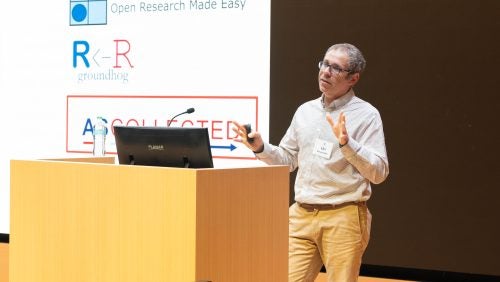Where Law and Data Meet: Georgetown Law Hosts 19th Annual Conference on Empirical Legal Studies
November 17, 2025

Uri Simonsohn, professor of behavioral science at ESADE Business School, delivered the keynote address at the 19th annual Conference on Empirical Legal Studies.
Leading scholars in law, economics, political science and other fields gathered at Georgetown Law Oct. 24 and 25 for the 19th annual Conference on Empirical Legal Studies (CELS), the premier conference for researchers interested in empirical analysis of law and legal institutions.
This year marks the first time Georgetown Law has hosted the two-day convening, which featured more than 40 discussion sessions highlighting 100-plus research papers on timely legal topics ranging from policing and public safety to election disputes and artificial intelligence. Founded in 2006 and co-sponsored by the Society for Empirical Legal Studies, the 2025 conference brought together nearly 200 interdisciplinary researchers from across the United States and the world who use quantitative methods to carry out their research.
“CELS is one of my favorite events of the year, so it was an honor to help host it here at Georgetown,” said Interim Dean Joshua C. Teitelbaum, who holds a Ph.D. in economics in addition to his law degree. Teitelbaum organized the conference in collaboration with Professor David Hyman and University of Michigan Law School Dean (and former Georgetown Law professor) Neel Sukhatme. “When I was in law school in the 1990s, this field of study was just emerging, so it’s been fascinating over the years to see how increasing numbers of scholars are using empirical methods to analyze various legal issues.”
Georgetown Law’s role in organizing this year’s conference builds on the Law Center’s longstanding history in empirical legal studies, including the establishment of the Law and Economics Program and Workshop more than 25 years ago. Since 2022, Georgetown Law faculty have published more than half a dozen articles in the Journal of Empirical Legal Studies, the official journal of the Society for Empirical Legal Studies.
‘Update your beliefs’
Professor Uri Simonsohn of ESADE Business School in Barcelona, Spain delivered the keynote address, “From False Positive to Positively False: Past & Future Efforts to Make Social Science More Credible.”
A behavioral scientist, Simonsohn is credited with helping bring to light the problem of false positive results in psychology and social science research. In 2013, he co-founded the blog “Data Colada,” which investigates and exposes data manipulation and other forms of research misconduct.
In his address, Simonsohn shared recent efforts to apply best practices learned from the social sciences replication crisis, such as improved data collection transparency, to economics research. “The whole point of doing research is to update your beliefs,” he said. “Fraud made reforming psychology possible by drawing so much attention to credibility.”
A ‘common language’ for scholars
For Associate Professor Filippo Lancieri, whose research focuses on the interplay between markets and governments, the keynote address was indeed one of the highlights of the conference.
“In a world where trust in scholarship and the role of academia in society are being challenged, it was powerful to have someone give a keynote about the ethics of our work and how to ensure that it is reproducible and rigorous,” he said following the event, adding, “I was also very impressed with the breadth and depth of the topics discussed throughout the conference.”
At the conference, Lancieri presented a recent paper he co-authored, “The Conflict-of-Interest Discount in The Marketplace of Ideas.” He noted that the session, in which his work was discussed alongside papers about disparities in hospital mortality and the global spread of empirical legal studies, highlighted the interdisciplinary nature of CELS — and the value of scholarly exchange and engagement between people with divergent backgrounds and research interests.
“The field of empirical legal studies is in the business of using different methods from very different areas — economics, business, accounting, computational and political sciences, sociology — to empirically measure and demonstrate relations between legal problems and questions that impact the law,” he said, likening empirical legal studies to a “common language” among researchers.
“What is interesting about empirical legal studies is that it is ultimately committed to methods more than questions,” he said. “It’s not about which questions you’re asking. It’s about how you answer the questions that you want to ask.”